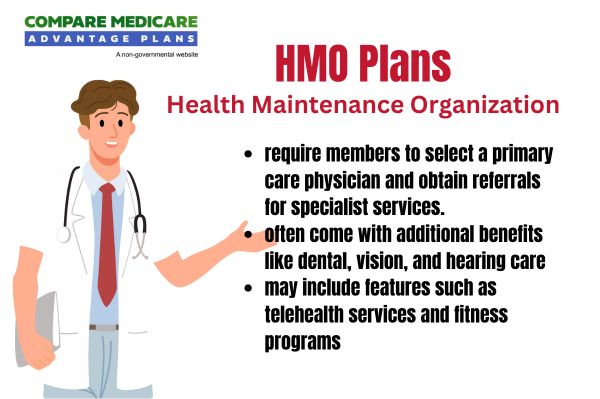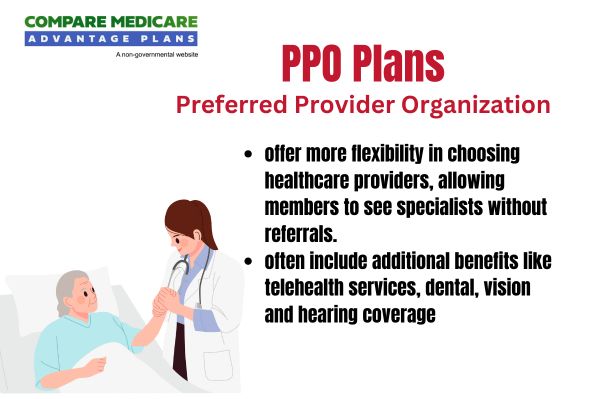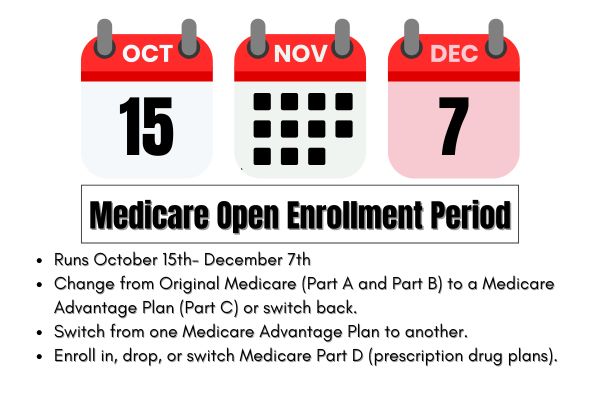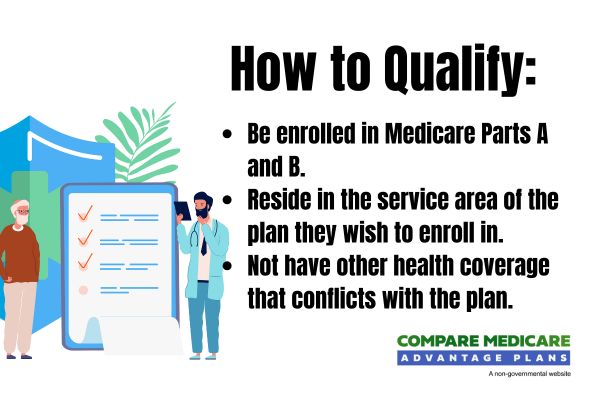




Medicare Advantage Plans Idaho 2026
Want to know what the Medicare Advantage plans in Idaho
Key Takeaways
- Medicare Advantage plans in Idaho will likely offer a variety of plan types, including HMO, PPO, and PFFS options, expanding choices for beneficiaries.
- Medicare Advantage Plans in Idaho will likely offer comprehensive coverage, sometimes including additional services not covered by Original Medicare, such as dental, vision, and hearing care.
- Enrollment periods for Medicare Advantage Plans are critical; beneficiaries must understand when to register or make changes to avoid lapses in coverage.
Compare Plans in One Step!
Enter Zip Code
Understanding Idaho Medicare Advantage Plans 2026

Medicare Advantage Plans, also known as Medicare Part C, are health plans offered by private insurance companies. These plans provide the same benefits of Original Medicare (Part A and Part B) and might include additional services like dental, vision, and hearing care. Unlike Original Medicare, Medicare Advantage Plans could potentially offer more comprehensive coverage, possibly making them an attractive option for many Idaho residents.
Types of Idaho Medicare Advantage Plans Available
Idaho will likely offer a variety of Medicare Advantage Plans to cater to different healthcare needs and preferences. These include Health Maintenance Organization (HMO) plans, Preferred Provider Organization (PPO) plans, and Special Needs Plans (SNPs).
Each type of plan has its unique features and benefits designed to meet the diverse requirements of Medicare beneficiaries.
HMO Plans

Health Maintenance Organization (HMO) plans may be popular choice among Idaho residents. These plans require members to use a specific network of healthcare providers to receive benefits, with exceptions only for emergencies. Typically, members must select a primary care physician who coordinates their care and provides referrals for specialist services. This coordinated care approach may result in lower out-of-pocket costs for members compared to other plan types.
PPO Plans

Preferred Provider Organization (PPO) plans offer greater flexibility compared to HMOs. Members may see any healthcare provider, but using in-network providers could result in lower out-of-pocket costs. Unlike HMO plans, PPO members do not need referrals to see specialists, which allows for more direct access to various healthcare services.
Enrollment in these plans will likely be subject to annual contract renewals with Medicare, ensuring that members have access to updated benefits and services each year.
Special Needs Plans (SNPs)

Special Needs Plans (SNPs) are tailored for individuals with specific health conditions, offering customized benefits and services to meet their unique needs. These plans cater to distinct groups, such as those with chronic conditions or those who are dual-eligible for Medicare and Medicaid. SNPs will likely focus on enhanced care management and coordinated services across different healthcare providers and settings.
To qualify for an SNP, individuals must meet specific eligibility criteria related to their health conditions. By providing tailored services and focused care coordination, SNPs will likely be designed to improve health outcomes for their members.
Overview of Idaho Medicare Advantage Plans
The Medicare Advantage market in Idaho has grown in recent years. Medicare Advantage plans in Idaho could potentially offer a cost-effective option for those seeking comprehensive healthcare coverage.
Major providers, such as Blue Cross of Idaho and UnitedHealthcare, might offer a range of plans that could meet diverse healthcare needs.
Covered Services and Potential Benefits
Some Medicare Advantage Plans in Idaho may cover a wide range of services that could beyond what Original Medicare offers. Certain plans might include benefits like dental, vision, and hearing care, and sometimes prescription drug coverage.
This comprehensive coverage could potentially ensure that members receive a holistic approach to their healthcare needs.
Potential Benefits of Idaho Medicare Advantage Plans 2026

Certain Idaho Medicare Advantage Plans may offer additional benefits that could make them an attractive option for Medicare beneficiaries. Some plans may incorporate dental, vision, and hearing benefits, which are not covered by Original Medicare.
Furthermore, certain Medicare Advantage Plans may also include prescription drug coverage and have an out-of-pocket maximum, possibly providing a safety net against high medical costs. With a broad selection of plans and wellness programs, these plans will likely promote preventive care and overall health.
Enrollment Process for Idaho Medicare Advantage Plans
Enrolling in a Medicare Advantage Plan in Idaho involves understanding the different enrollment periods and the criteria for eligibility. Idaho’s open enrollment period for Medicare Advantage Plans runs from October 15 to December 7 each year.
Residents must first enroll in Original Medicare (Parts A and B) to become eligible for these plans. Understanding the enrollment process ensures that beneficiaries can select the best plan for their needs without missing important deadlines.
To enroll, use this website or speak to one of our licensed agents by calling 1-833-641-4938 (TTY 711), Mon-Fri 8 am-9 pm EST today.
When to Enroll

The timing of enrollment is crucial for those looking to join a Medicare Advantage Plan. The Initial Enrollment Period begins three months before an individual’s 65th birthday and lasts for seven months. For those already enrolled in a Medicare Advantage Plan, the Annual Enrollment Period (AEP) from October 15 to December 7 allows them to make changes or switch plans. A Special Enrollment Period (SEP) is available, which runs from December 8 to February 28 each year.
To avoid losing coverage, it’s essential to enroll in a new plan by the end of the year if your current plan is discontinued. This ensures continuous coverage and access to healthcare services without interruption. Understanding these periods helps beneficiaries plan their healthcare effectively and avoid any gaps in coverage.
Different Enrollment Periods
Various enrollment periods serve different purposes for Medicare beneficiaries. The Open Enrollment Period from January 1 to March 31 allows individuals who missed earlier enrollment periods to sign up for Medicare. The Initial Enrollment Period spans seven months around an individual’s eligibility for Medicare, providing a window to join a Medicare Advantage Plan.
The Annual Election Period (AEP) from October 15 to December 7 enables enrollees to switch or drop their Medicare Advantage Plans, with changes taking effect the following January. The Medicare Advantage Open Enrollment Period from January 1 to March 31 allows beneficiaries to switch plans or return to Original Medicare.
OEP, AEP, Special Enrollment
The Open Enrollment Period (OEP) follows the Annual Enrollment Period (AEP) and offers a chance to make limited changes to Medicare Advantage Plans. This period runs from January 1 to March 31 each year, allowing beneficiaries to switch to another Medicare Advantage Plan or revert to Original Medicare. This flexibility ensures that members can adjust their coverage based on their evolving healthcare needs.
Special Enrollment Periods (SEPs) are triggered by specific life events, such as losing existing coverage or moving to a new plan area. These periods provide an opportunity to enroll in or modify Medicare plans outside the regular enrollment windows. Understanding the differences between OEP, AEP, and SEPs helps beneficiaries navigate their options and maintain appropriate coverage.
Potential Costs Associated with Idaho Medicare Advantage Plans
The costs associated with Medicare Advantage Plans in Idaho may vary widely based on the specific plan chosen. These costs might include premiums, co-pays, and out-of-pocket maximums.
Understanding the potential costs could help beneficiaries choose a plan that fits their budget and healthcare needs.
Premiums and Co-Pays
Premiums and co-pays will likely be critical components when selecting a Medicare Advantage Plan. Premiums for Medicare Advantage Plans might vary, with some plans offering lower premiums compared to Original Medicare. In addition to the Medicare Part B premium, members may also need need to pay the plan’s premium, if applicable. Co-pays for services under certain plans may also vary significantly. Understanding these costs could help beneficiaries manage their healthcare expenses more effectively.
Out-of-Pocket Maximums
Some Medicare Advantage Plans may incorporate out-of-pocket maximums, which could potentially protect members from excessive annual healthcare expenses.
The out-of-pocket maximum may vary across different plans, reflecting the specific benefits and coverage levels they provide. Some plans may also have different out-of-pocket limits depending on whether members use in-network or out-of-network providers.
Understanding these potential limits could help beneficiaries plan their healthcare expenses and potentially ensure they have predictable costs and financial protection against high medical bills.
Covered Services and Possible Benefits
Certain Medicare Advantage Plans in Idaho may offer a comprehensive range of covered services and benefits that could go beyond what Original Medicare provides. Beneficiaries could potentially benefit from additional services like dental, vision, and hearing coverage.
How to Qualify for Idaho Medicare Advantage Plans 2026

Individuals must be eligible for Medicare Part A and Part B and generally reside in the plan’s service area to qualify for Medicare Advantage Plans in Idaho. Some plans, like Special Needs Plans, have specific eligibility requirements, such as being enrolled in both Medicare and Medicaid.
Enrollment typically necessitates that applicants do not have end-stage renal disease (ESRD), although exceptions may apply. Individuals can qualify during specific enrollment periods, including the Open Enrollment Period and the Special Enrollment Period.
Idaho residents need to enroll in Original Medicare (Parts A and B) first to be eligible for any Medicare Advantage plans. Additionally, U.S. citizenship or legal residency for at least five years is required. Understanding these qualifications ensures that potential beneficiaries can access the coverage they need.
Contracted Network and Access to Care
Access to care in Medicare Advantage Plans is managed through contracted networks of healthcare providers. PPO plans allow members to use any healthcare provider who accepts Medicare, offering flexibility in provider choice. However, in-network providers might provide care at lower costs compared to out-of-network options.
In HMO plans, members are usually required to choose a primary care provider who coordinates their healthcare. Special Needs Plans (SNPs) cater to individuals with specific health needs and often have tailored networks to meet those needs.
Comparing Idaho Medicare Advantage Plans to Original Medicare
When comparing Medicare Advantage Plans to Original Medicare, it’s essential to consider the potential differences in coverage and costs. Certain Medicare Advantage Plans may provide additional benefits and services that Original Medicare does not, likely making them an attractive option for many beneficiaries.
Cost Comparisons
Costs for Medicare Advantage Plans might vary based on premiums, deductibles, and out-of-pocket maximums, likely affecting overall affordability. Potential benefits like dental and vision coverage may also impact the total cost. The out-of-pocket maximum for certain plans could range widely, possibly influencing a member’s financial exposure in a given year.
Some Medicare Advantage Plans may offer lower premium options, which may be appealing for budget-conscious enrollees. Comparing the potential costs associated with Medicare Advantage Plans and Original Medicare could help beneficiaries make informed decisions about their healthcare coverage, likely ensuring they choose the plan that best meets their financial and healthcare needs.
Emergencies and Referrals

Emergencies and referrals are handled efficiently under Medicare Advantage Plans. Medicare Advantage PPO plans, for instance, do not require referrals for specialist visits, allowing for more direct access to healthcare providers. Emergency care is covered worldwide, ensuring that members have access to urgent medical services regardless of their location.
Although in-network providers might offer lower costs, members could also seek care from out-of-network providers, though it may result in higher expenses. During declared emergencies, members may receive care from out-of-network providers at in-network cost sharing, ensuring they get the care they need without additional financial burden.
Summary
Medicare Advantage Plans in Idaho
Frequently Asked Questions
→ What are Medicare Advantage Plans?
Medicare Advantage Plans, or Medicare Part C, are private insurance plans that encompass all the benefits of Original Medicare while occasionally providing additional services such as dental, vision, and hearing care.
→ What types of Medicare Advantage Plans are available in Idaho?
In Idaho, you can choose from several Medicare Advantage Plans, including Health Maintenance Organization (HMO) plans, Preferred Provider Organization (PPO) plans, and Special Needs Plans (SNPs). These options provide flexibility and tailored services to meet your healthcare needs.
→ How much do Medicare Advantage Plans in Idaho cost?
Medicare Advantage Plans in Idaho may vary significantly in cost, as some plans may offer lower premiums, depending on the specific coverage options selected. It’s essential to compare different plans to find one that fits your budget and healthcare needs.
→ When can I enroll in a Medicare Advantage Plan in Idaho?
You can enroll in a Medicare Advantage Plan in Idaho during the Initial Enrollment Period, the Annual Enrollment Period from October 15 to December 7, or during Special Enrollment Periods due to specific life events. Make sure to take advantage of these timeframes to secure your coverage.
→ What additional benefits could Medicare Advantage Plans offer?
Some Medicare Advantage Plans may offer extra benefits like dental, vision, and hearing care, and sometimes prescription drug coverage, possibly enhancing your healthcare experience beyond what Original Medicare provides. Members should consider these potential benefits when evaluating their options for comprehensive coverage.

ZRN Health & Financial Services, LLC, a Texas limited liability company




